 |
|||||
 |
 |
 |
 |
 |
 |
 |
Herb of the Season: Hops |
||||
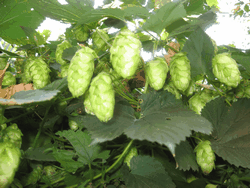 It’s time to go out and harvest your Hops if you live anywhere in the Montreal area! This creeping vine will quickly cover your fence or trellis with large dark green leaves each spring, much like a grapevine, offering a green wall of privacy. It loves to climb and has excellent gripping ability which is sometimes known to grab out at unsuspecting passers-by and remind them to Pay Attention and Live in the Moment! (As a result, it’s probably best not to plant your Hops in a central pathway unless it’s going to be well managed!) Mid-summer, the strobules or cones (comparable to small, soft, green pinecones) will grow much like flowers, covering your vines. They’ll gradually turn from bright green to yellow as the days shorten, letting you know they’re ready to harvest. Hops grew wild among the willows in Roman times and were said to grow like a "wolf among sheep" resulting in its original name Lupus salictarius, which means the "good wolf." ** Hops later took its botanical name of humulus lupulus, and once rooted in your sunny garden it will provide you with abundant medicine and enough offspring to dig up and share! 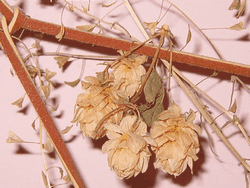 Herbalists have recommended Hops for insomnia, restlessness and anxiety for over a thousand years. Hops affects the nervous system and the digestive system but it is best known for its ability to relax the entire body, perhaps due to the fact that it belongs in the Cannabinacea family. It may be the reason why people loosen up after a beer or two! Hops is commonly used to flavour and preserve beer. The same antiseptic and anti-microbial properties that preserve beer are known to have a special affinity for our digestive system. In the stomach this aromatic bitter herb checks fermentative activity and has anti-spasmodic actions. It is especially useful for those who have stomach problems as a result of eating poorly due to stress. Hops also provides nerve-relaxing B vitamins (riboflavin & niacin), capillary-strengthening bioflavonoids, immune-boosting Vitamin C, potassium and selenium. 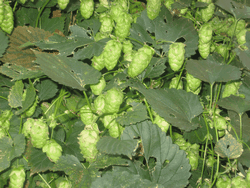 I’d turn to hops after I tried nourishing nervine tonics such as chamomile (Matricaria chamomilla) tea, milky-stage oats (Avena sativa) or lemon balm (Melissa officinale) infusions for anxious moments or my inability to sleep. Humulus lupulus is not so much a tonic as a sedative which targets the central nervous system. It’s a strong nervine… way up there with valerian. Susun Weed describes Hops as a nutritive painkiller and sleep inducing herb. In a James Green lecture at the 5th International Herb Symposium, 2000, Humulus was identified as the best remedy for people who, when stressed, became red-faced, with throbbing temples who think & think themselves into a state of agitation! It’s important to note however that Hops is never recommended during depression. 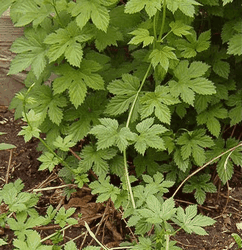 Hospitals in the 50s used to offer beer to nursing mothers in the maternity ward both to help them relax and to increase lactation caused by Hops’ estrogen content. Hops contains high levels of phytoestrogens ... anywhere from 30,000 to 300,000 per 100 grams. Many studies have shown how phytoestrogens help prevent breast cancer. Foods containing anti- cancer phytoestrogens include legumes (dried beans, peas, lentils, soy & red clover), sweet potatoes, parsnips yams, burdock root, ginseng and hops. Women are encouraged to eat colourful diets not only to decrease the chance of cancer but to promote sufficient estrogen production throughout our lives. Gail Faith Edwards succinctly explains the role estrogen plays in the chemistry of menopause: “Well into our menopausal transition, our estrogen production will slowly and gradually decline, reach a base level, and then stabilize. Given the nourishment she needs, a woman can produce enough estrogen to protect her heart, bones and brain, for the rest of her life, and indeed, estrogen’s main purpose after our childbearing years appears to be just that.” (pg. 45) 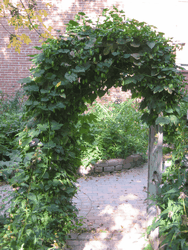 Unfortunately men should avoid excessive estrogen as they weave their way through the spiral of life. Soy products should be eaten in moderation and hops flavoured beer should be avoided! Hops is classified as an anaphrodisiac due to its high estrogen content and consuming it may result in a decrease in sexual drive, erection and desire. Throughout history other plants such as yarrow, nettles, pine and dandelion were used to flavour beer without these adverse effects. Whenever we stop in at a micro-brewery, or a beer promo stand, I ask if they brew a beer without hops. I hope there’s enough demand for non-hops beer now so our men may have a few beer options in the future without having to compromise their vitality. I’ve dried hops and stuffed them into small flat pillows with dried lavender blossoms. The pillow is then slipped under your pillowcase and the aroma of hops and lavender is inhaled as you sleep. Hopefully it will calm your nerves and promote deep sleep when you need it. The dried hops can also be infused for a rather bitter tea before bed for the same relaxed effect. I’ve tinctured fresh Hops in Sambuca, Drambuie and Brandy trying to tame its’ bitterness but I’ve come to appreciate the bitterness as an integral part of why the herb works! It bites through no matter what menstruum you use! To make you own tincture follow the simple directions on the Herbal Health Root using your favourite alcohol. Happy Harvesting! ** www.coopsmaps.com/beer/hops.html A Short History of Hops |
|||||
 | |||||
|
Over the years I have been blessed with many inspirational teachers. I thank them for sharing their wisdom through their lectures, workshops, websites and books. For more information about Hops and many other herbs, enjoy these insightful and informative resources: | |||||
| Sacred and Herbal Healing Beers by Stephen H. Buhner |
(Sirus Books, 1998) |
||||
| Traversing the Wild Terrain of Menopause by Gail Faith Edwards |
(Bertha Canterbury Press, 2000) Click for website | ||||
| The Male Herbal by James Green |
(Crossing Press, 2007) | ||||
| Breast Cancer? Breast Health! The Wise Woman Way by Susun S. Weed |
(Ash Tree Publishing, 1996) Click for website |
||||

|
|||||
 ©2026 Monica Giacomin ©2026 Monica Giacomin |
|||||